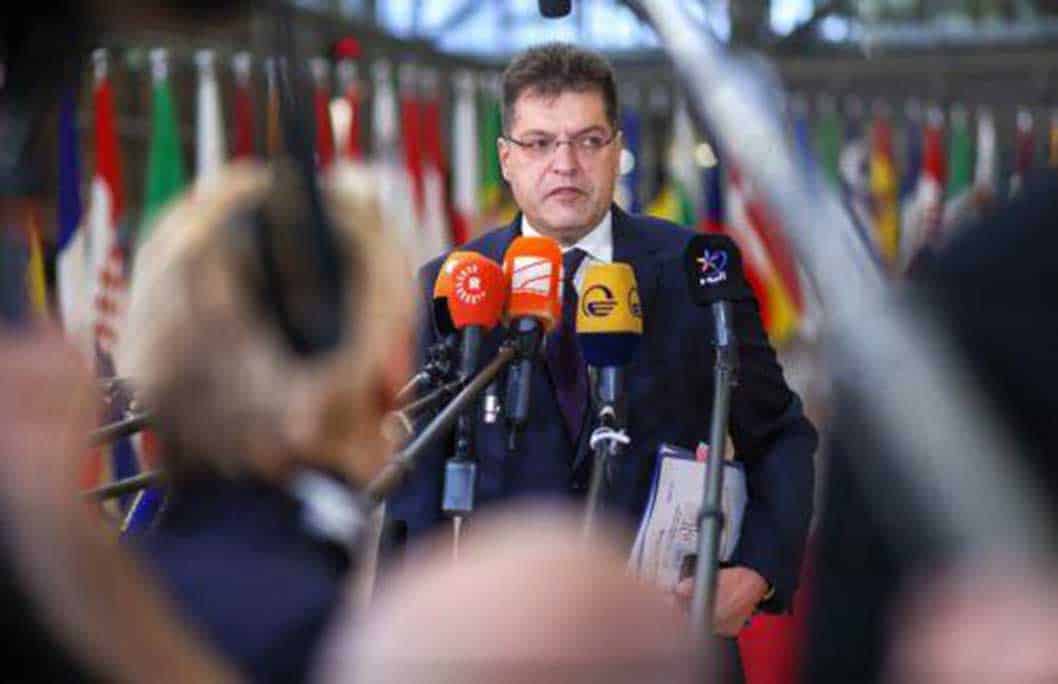The top EU official for crisis management said on Monday that there were practical issues with the logistics of creating a sea route, or humanitarian aid corridor to Gaza, as proposed by Cyprus.
Commissioner for Crisis Management, Yanes Lenarcic, speaking to the media ahead of the Foreign Affairs Council meeting in Brussels to discuss the possibility, said there were no docking and offloading facilities on the shores of the Gaza Strip, which would have to be created.
According to CNA, Lenarcic also stressed the need to get fuel to Gaza, as well as introducing humanitarian pauses yet to be agreed. These should be specific, announced in a timely manner, and allow enough time for humanitarian agencies to respond, he said.
The maritime corridor, Lenarcic said in response to a related question, was one of the possible solutions and the EU would support “every possibility that exists”.
“The problem with regard to the logistics for the maritime corridor is that at the moment there are no docking and unloading facilities on the shores of Gaza,” he said, and these would have to be created.
Earlier on Monday, Cyprus’ Foreign Minister Constantinos Kombos said he would be presenting the government’s proposal.
“Today, I will present Cyprus’ initiative for a maritime humanitarian corridor for delivering assistance to the people of Gaza,” Kombos said on arrival at the EU Council building.
He elaborated on the proposal, describing it as a “secure, fully monitored, and quarantined hub with various options for the gradual delivery of aid in significant volumes and at high frequencies.”
According to the foreign minister, the proposed solution is supported by three key factors.
“Firstly, geographical proximity to Gaza, secondly, existing infrastructure in Cyprus, and finally, strategic relationships with relevant parties and key players in the region, fostering political confidence,” he said.
“We have initiated this discussion and will continue working towards a positive outcome,” Kombos added. Responding to a question about the support the proposal is receiving, he also expressed hope to increase the support it already has.
The proposal is expected to be a subject of discussion and consideration among EU foreign ministers during the Foreign Affairs Council meeting, as the international community seeks effective and collaborative solutions to alleviate the challenges faced by people in Gaza.
Lenarcic said the humanitarian situation in Gaza was “catastrophic and getting worse by the hour”.
The priorities were first “to allow many more humanitarian aid trucks to enter” and “to distribute them throughout the Gaza Strip , where there are people in need of humanitarian assistance”, he said.
In order to do this, he added, it was urgent to define and respect the humanitarian pauses that will be agreed upon.
Lenarcic particularly referred to the need in the Gaza Strip for fuel, as more than half of the hospitals in Gaza cannot function without power.
Regarding the proposal for humanitarian pauses, he stressed that “these pauses must be meaningful”, be “announced in time for humanitarian organisations to be ready” to carry out their mission, and be clearly defined in terms of starting and their end, as well as their duration.
On his way to the meeting on Monday, European Union foreign policy chief Josep Borrell referred back to an EU statement issued on Sunday condemning Hamas for using “hospitals and civilians as human shields” in Gaza, while also urging Israel to show “maximum restraint” to protect civilians.
“In this [EU] 27 Statement, we ask for immediate pauses. I am saying that in plural. Not a single one but several ones, pauses. But it is an adjective, it is ‘immediate’ pauses and humanitarian corridors to be established in order to face the dire situation of the people in Gaza,” said Borrell. “Gaza needs more aid from any point of view – water, fuel, food. This aid is available, it is at the border, waiting to come in.”
Borrell also said it had been difficult at times after the vote at the United Nations where EU countries were voting in different ways, “to present a completely united approach”.
He also said it was time for the EU foreign ministers to start thinking about the solution for the aftermath of the war.
“This is something the ministers should, from my understanding, concentrate on [in] the discussion: what is going to happen after, what and how we can deal with Gaza, not only to reconstruct but to offer an integrated solution to the Palestinian issue,” he said.
“This is the real political problem that we have to face, which is the definitive solution to the conflict between Israel and Palestine that has reached this high level of horror. We have to look for peace among them. The solution for Gaza cannot be an isolated solution. I will explain to the ministers what I think about it, what I think could happen, what we should support and what we should reject. I am going to present several ‘yes’s’ and several ‘no’s’”.
The Foreign Affairs Council is taking place over two days and is being chaired by Borrell. On Monday the ministers were discussing Russian aggression against Ukraine and the latest developments concerning Armenia and Azerbaijan. The council were then due to exchange views on the situation in Israel and the region, the foreign policy dimension of economic security.







Click here to change your cookie preferences